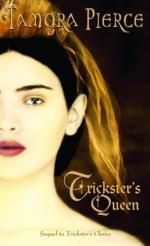|
This section contains 2,146 words (approx. 8 pages at 300 words per page) |

|
African tricksters speak and embody a vivid, subtle language of sacred transformation. Through it they strike up absurd conversations between laundresses and goddesses, sex and death, flatulence and spiritual power, breaking the univocal by the anomalous and so opening human life—bodily, daily, defined—to its sacramental immensity. Like their counterparts in Amerindian myth and folklore, African tricksters inject bawdiness, rebellion, and wild lying (one might aptly call it polymorphous perversity) into the mythic history and the common experience of divine-human relations wherever they appear. Unlike many tricksters elsewhere, however, these multiform world-shatterers and pathfinders in Africa are woven not only into the fabric of myth but also into the stuff of everyday life, playing a part in economics, rites of passage, and ordinary conversation. This observation may tell more about the history of Western colonialism and ethnography than it does about the tricksters of non-Westerners...
|
This section contains 2,146 words (approx. 8 pages at 300 words per page) |

|



![View Tricksters North American Tricksters [first Edition]](https://d22o6al7s0pvzr.cloudfront.net/images/bookrags/aero300/content/btn_next.png?1706062909)
